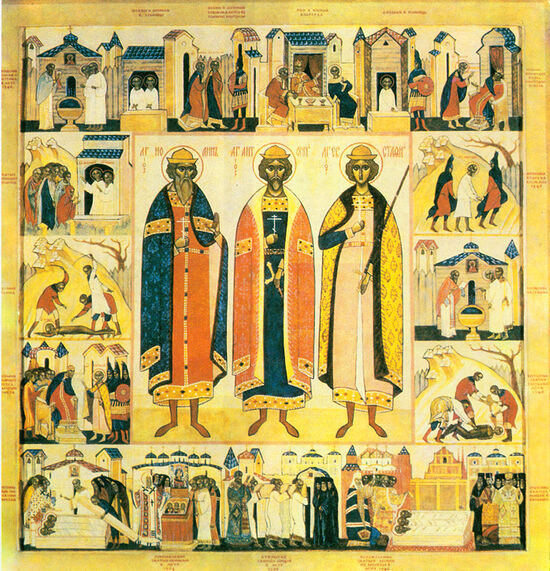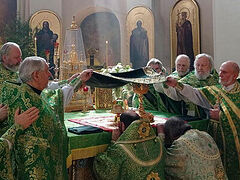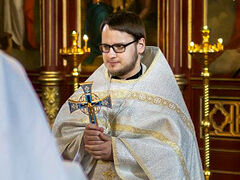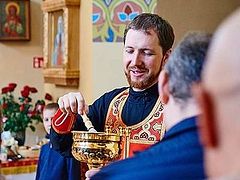The holy martyrs Anthony, John, and Eustathius suffered for Christ under Prince Algirdas of Lithuania (1345-1377). The Prince was married to the Orthodox Princess of Vitebsk Maria Yaroslavna († 1346). He himself was baptized and he allowed the preaching of Christianity while his wife was alive. Two brothers, the courtiers Nizilas and Kumetis, were baptized by the princess’ spiritual father, Fr. Nestor, with the names Anthony and John. An Orthodox church was even built in Vilnius at Maria’s request.
But after the death of his wife, Prince Algirdas started openly supporting the priests of the fire-worshipers, who had begun persecuting Christians. St. John and Anthony tried not to show that they were Christians, but they no longer observed pagan customs—they didn’t cut their hair as the pagans did, and they observed fasting days.
Soon the Prince suspected the brothers of apostasy. He interrogated them, and they confessed themselves to be Christians. Then he tried to force them to eat meat (it was a fasting day). The holy brothers refused, and the Prince imprisoned them. The brothers languished in captivity for an entire year. John feared the torment that awaited him and announced that he would fulfill all the Prince’s orders. Overjoyed, Algirdas released the brothers and called them to himself.
But Anthony didn’t betray Christ. When he again refused to eat meat on a fasting day, the Prince again imprisoned him and subjected him to cruel tortures. The brother who renounced Christ remained free, but no one would speak with him—neither Christians nor pagans—seeing him as a traitor. Repenting of his sin, John went to Fr. Nestor and asked him to intercede before his brother, so he would forgive him and receive him back. “When he openly confesses Christ, then we’ll have all things in common,” replied the Martyr Anthony.
One day, while serving the Prince in the sauna, St. John privately told him about his reconciliation with the Church. Algirdas didn’t display any anger, and he made it clear that it was his personal business and he could believe in Christ, but that he should behave like a pagan. Then St. John confessed himself to be a Christian in the presence of numerous courtiers. He was severely beaten with sticks and sent back to prison with his brother. The martyrs joyously met in prison, and that day they communed of the Holy Mysteries.
Crowds of people came to the prison to see the new confessor. By their prayers, the brothers converted many to Christ. The prison turned into a Christian school. The frightened pagan priests demanded the brothers be executed, but they no longer feared temporary separation. On the morning of April 14, 1347, after receiving the Holy Mysteries, the martyr Anthony was hung from a tree. This oak tree, considered sacred by the pagans, became truly sacred for Orthodox Lithuanians from then on.
The priests’ hopes that the preaching of Christ would cease with the death of St. Anthony weren’t realized. Many people were still gathered around the prison where St. John was. On April 24, 1347, he was strangled and hung from the same oak. The precious bodies of both martyrs were buried by Christians in the Church of St. Nicholas the Wonderworker.
The third to suffer for faith in Christ was Krulis, whom Fr. Nestor named Eustathius in Baptism. He was a relative of the holy brothers. Among the Lithuanian Prince’s retinue, Krulis was distinguished by his comeliness, bravery, and valor, but even more so for his mind and his spiritual kindness. A favorite of Algirdas, he had a bright future ahead of him. But one day, like the martyred brothers, he refused to eat meat at a festal meal. St. Eustathius openly declared himself a Christian and said that he wouldn’t eat meat because it was the Nativity Fast. They immediately started beating him with iron rods, but the young man let out not a single wail.
The Prince then refined his tortures. There was a severe frost. Algirdas ordered that the martyr be stripped naked, taken outside, and ice water poured into his mouth. But it couldn’t break the saint’s spirit. Then they broke the bones of his legs from his heels to his knees, tore out his hair and his scalp with it, and cut off his ears and nose. St. Eustathius endured the tortures with such joy and vitality that the torturers themselves were amazed at the Divine power that strengthened him. After being tortured, Martyr Eustathius was sentenced to death and hung from the same oak tree († December 13, 1347) upon which Sts. John and Anthony earlier met their martyric ends.
For three days, no one was permitted to remove his body, and a pillar of cloud protected him from birds of prey and beasts. A temple was later erected on the hill where the holy martyrs suffered. The trinity of honorable passion-bearers glorified the true God, worshiped in the Holy Trinity—the Father, Son, and Holy Spirit—therefore the church was consecrated in the name of the Most Holy Trinity. The altar was built on the stump of the sacred oak tree upon which the martyrs were killed.
Their incorrupt relics were soon uncovered. Already in 1364, Patriarch Philomenos of Constantinople (1354-1355, 1362-1376) sent a cross to St. Sergius of Radonezh († 1392) with relics of the holy martyrs. The Church resolved to celebrate the memory of all three martyrs together, on April 14. The feat of the holy martyrs was of great importance for the whole western region. The Vilnius Monastery of the Most Holy Trinity, where their holy relics were kept, became a stronghold of Orthodoxy and peace in the region. In 1915 when the Germans attacked, their relics, as the most precious sacred treasure in the Baltic region, were taken to the heart of Russia—Moscow.
The relics of the holy passion-bearers were festively greeted upon their return to Vilnius, to the Holy Spirit Monastery, in 1946. The date of their return, July 13/26, has been festively celebrated at the monastery ever since.
In August 2019, the Holy Synod of the Russian Orthodox Church established the feast of All Saints Who Have Shone Forth in the Lithuanian Land, also to be celebrated on July 13/26, on the feast of Sts. Anthony, John, and Eustathius.




